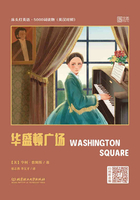
Chapter 3
When it had been impressed upon her that she was a young lady—it was a good while before she could believe it—she suddenly developed a lively taste for dress. She sought to be eloquent in her garments, and to make up for her shyness of speech by a fine frankness of costume.
The Doctor, however, limited her spending money, as he feared she would embarrass herself by overcompensating for her lack of looks and social skills with ridiculously luxurious attire. He had a dread of vulgarity, and felt that a well-bred young woman should not carry half her fortune on her back. Catherine's back was a broad one, and would have carried a good deal; but it was not until the age of twenty that she treated herself to a red silk gown trimmed with gold fringe.
It was in this dress that she presented herself at a little entertainment given by her aunt, Mrs. Almond. The girl was at this time in her twenty-first year, and Mrs. Almond's party was the beginning of something very important.
Some three or four years before this Dr. Sloper had moved his household uptown, as they say in New York. He had been living, ever since his marriage, in a red brick house, standing in a street within five minutes' walk of the City Hall. After this, the tide of fashion began to move north. By the time the Doctor changed his residence the murmur of trade had become a great uproar, which was music in the ears of all good citizens interested in the commercial development of their fortunate island. Dr. Sloper's interest in this phenomenon was only indirect—though, seeing that, as the years went on, half his patients came to be overworked men of business, it might have been more immediate—and when most of his neighbors' dwellings had been converted into offices, warehouses, and shipping agencies, and otherwise, he determined to look out for a quieter home.
The ideal of quiet, in 1835, was found in Washington Square, where the Doctor built himself a handsome, modern, wide-fronted house, with a big balcony before the drawing-room windows. This structure and many of its neighbors remain to this day very solid and honorable dwellings. In front of them was the Square, containing a considerable quantity of inexpensive vegetation, enclosed by a wooden fence, which increased its rural appearance. Around the corner was the Fifth Avenue. This portion of New York, even today, appears to many persons the most attractive. It is a kind of established resting place, which is not of frequent occurrence in other quarters of the long, noisy city. It was here that my heroine spent many years of her life.
Mrs. Almond lived much farther uptown. Catherine had a great many cousins, and with her Aunt Almond's children,who ended by being nine in number, she lived on terms of considerable intimacy. When she was younger they had been rather afraid of her; she was believed to be highly educated in the hands of their Aunt Penniman, who, among the little Almonds, was an object of more admiration than sympathy. Her manners were strange and formidable, and her mourning robes—she dressed in black for twenty years after her husband's death, and then suddenly appeared one morning with pink roses in her cap—were complicated in odd, unexpected places with accessories. For several years Catherine played with her young kinsmen. I say young kinsmen, because seven of the little Almonds were boys, and Catherine had a preference for those games which are most conveniently played in trousers. By degrees, however, the little Almonds' trousers began to lengthen, and the wearers to disperse and settle themselves in life. The elder children were older than Catherine, and the boys were sent to college or placed in counting-rooms. Of the girls, one married very punctually, and the other as punctually became engaged. It was to celebrate this latter event that Mrs. Almond gave the little party I have mentioned. Her daughter was to marry a young stockbroker, a boy of twenty; it was thought a very good thing.
eloquent/ˈeləkwənt/adj. 有口才的,善辩的
garments/ˈɡɑ:mənts/n.(可数名词)衣服
frankness/ˈf ræŋk nɪs/n. 坦白,率直
costume/ˈkɒstju:m/n.(不可数名词)服装的式样
embarrass/ɪmˈbærəs/v t. 使困窘,使局促不安;使焦急
overcompensate/ˌəʊvəˈkɒmpenseɪt/vi. 过于补偿;(此处)过于修饰
ridiculously/rɪˈdɪkjʊləslɪ/adv.荒唐地
attire /əˈtaɪə/ n.(文学或诗歌)服装
dread/dred/n.畏惧,害怕
vulgarity/vʌlˈɡærətɪ/n.粗俗的行为,粗鄙
well-bred/ˈwelˈbred/adj.有良好教养的
trim/trɪm/vt.修饰(帽、衣等)
fringe/frɪndʒ/n.(地毯或围巾等的)须边,穗,流苏
household/ˈhaʊs həʊl d/n. 全家的人
uptown/ˈʌpˈtaʊn/a d v.(美)在住宅区或非商业区
tide/taɪd/n.潮流
residence/ˈrezɪdəns/n. 住处,住宅(尤指大的或堂皇的)
murmur /ˈmɜ:mə/ n. 低语,轻语
uproar/ˈʌprɔ:/n. 喧嚣,骚动,鼓噪;爆出喧嚣声
commercial/kəˈmɜ:ʃəl/adj. 商业的
phenomenon /fɪˈnɒmɪnən/ n. (pl. phenomena) 现象
indirect/ˌɪndɪˈrekt/adj.间接的
dwelling/ˈdwelɪŋ/n.住处,住宅
convert/kənˈvɜ:t/vt.使转变
warehouse/ˈw eəhaʊs/n.仓库;货栈;家具寄存的栈房
agency/ˈeɪdʒənsɪ/n. 经销;代办,代理;经销处,代理处
ideal /aɪˈdɪəl/ n. 理想的东西;(此处)理想的住所
structure/ˈstrʌktʃə/n. 建筑物;构造物
honorable/ˈɒnərəbl/adj. 可敬的,高尚的;光荣的
vegetation /ˌvedʒɪˈteɪʃən/ n. (不可数)(泛指一般的)植物,草木
enclose /ɪnˈkləʊz/ vt. 围以墙、篱等,包围
rural/ˈrʊərəl/adj. 乡村的;有乡村特色的
established/ɪˈs tæb lɪʃt/v t. 已确立的;确定的
occurrence/əˈkʌrəns/n.发生;事件
intimacy/ˈɪntɪməsɪ/n.亲近,亲密
highly/ˈhaɪlɪ/a d v. 高度地,非常地
Almonds/ˈɑ:mənds/n. 艾尔蒙德家的孩子
sympathy /ˈsɪmpəθɪ/ n. 同情,怜悯
robe /rəʊb/ n. 宽松长袍
unexpected/ˌʌnɪksˈpektɪd/adj.出乎意料的
accessory /əkˈsesərɪ/ n. 附件;配饰
kinsman/ˈkɪnzmən/n.男性亲戚
disperse /dɪsˈpɜ:s/ vi. 驱散,散开
stockbroker /ˈstɒkˌbrəʊkə/ n.证券经纪人